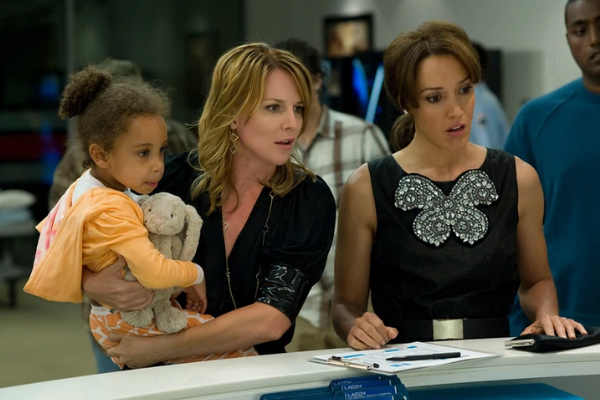Recently, I’ve been in the mood for binge rewatching some of my favorite TV shows, including The L Word. There is a particular episode with Bette and Tina that stands out to me as a Black, queer, nonbinary femme viewer.
For context, Bette is Black and white, Tina is white, and they’re trying to have a baby. Bette found a Black donor and connected him with Tina. An argument erupts after Tina met with him because she felt caught off guard that Bette didn’t tell her in advance that he was Black. During their fight, Tina confesses, “I don’t feel qualified to be the mother of a child who’s half-African-American. I don’t know what it means to be Black.” To Tina, having two lesbian moms on top of being Black was a lot of otherness to put on a child.
This response outraged me. I empathize with Tina because as Black queer person, I don’t even feel qualified to parent a Black child in this world where their Blackness is a liability. Still, I was pissed at Tina. She wasn’t thinking of her white privilege and how Bette didn’t really have a choice in how many layers of oppression she would carry around as a Black, lesbian woman.
I was reminded of Dr. Bettina Love’s point on the difference between allies, accomplices or co-conspirators when thinking about Tina’s commitment to spending the rest of her life with someone who is “racially ambiguous” or white-passing but backtracking when things got real. As an ally, Tina was 100% on board but when things got extra personal and required her to risk something – comfort with whiteness – she was not ready for all that. To move from being a theoretical ally to an accomplice or co-conspirator would have required her to put something on the line. I was furious watching this argument unravel between Tina and Better. I was disappointed in Tina. How many people can choose the race of their biological child?
I do feel for Tina’s character and understand her fears of raising a biracial child in a world where Black lives don’t matter. However, I can’t help but think about my Black (Indigenous African) parents and other parents of color who can’t opt their children out of racial oppression.
Bette and Tina’s arguments and discussions also reminded me of a conversation I continue to have with my current partner who is a white American man. When we discuss long-term family plans, I have to ask my partner if he feels ready to parent and be an ongoing advocate of our Black children. I remember when we were watching a clip from a Grey’s Anatomy episode where two Black parents (Miranda and Ben) train their Black son on how to behave around police. Prior to meeting me, my partner had never experienced being pulled over, patted down, and having more police called for backup because of assumed criminality. He never needed multiple dash cams to document every moment of being on the road. These are the types of conversations and reflections my partner and I have to have because the privileges he carries as a white American citizen do not transfer to me and will not necessarily follow our future children. Our kids are more than likely to be coded as Black and to have their Americanness questioned if we give them Indigenous Bari or Pojolo tribal names to honor my family’s naming traditions.
My partner and I talk about social issues on a daily basis because we both want him to fully understand what life may be like for our future children. Honestly, it’s exhausting and they’ve come a long way but sometimes I just want to watch trash TV and not talk about the intersection of power and oppression in everyday life. I do want him to be an equal co-facilitator and educator when it comes to teaching our children about racism, sexism, homophobia, transphobia, classism, police brutality, discrimination, micro-aggressions, and different forms of oppression.
When we started dating, my partner was probably a lot like Tina – completely oblivious to their white privilege on an interpersonal level and structural level. We have been together for quite some time now and he’s come a long way, from Dr. Bettina Love’s profile of an ally to moving toward an accomplice or co-conspirator status. They know too well that it is not my job to educate them on issues related to being Black, queer, nonbinary, an immigrant, life in poverty or any struggle they never lived. He knows that part of being in this interracial queer relationship is finding ways to educate and involve himself so he can be a more conscientious person and disrupt systems that were designed for people with his privileges. As an accomplice or conspirator in an interracial queer marriage, he understands that my queer pride cannot be separated from my Blackness, my asylee experience, my rejection of gender norms in an Orthodox Muslim country, and other intersecting identities that shape my world.
If Tina’s character resonates for you, especially the minimization of the power of whiteness, I do encourage you to self-reflect and gauge where you fall on the allyship to an accomplice or co-conspirator continuum. It is a long and laborious journey of learning and relearning new behaviors that disrupt the harmful beliefs we’ve been taught to internalize and perpetuate. I hope you are willing to take risks, recognize you racial privileges, and understand the complexities of being in an interracial relationship.


